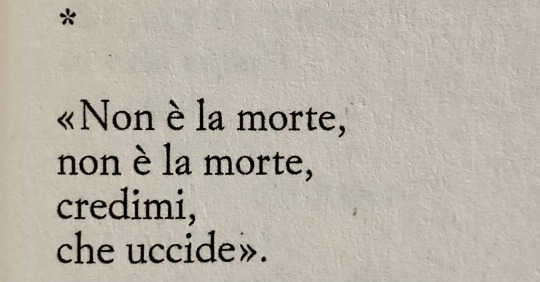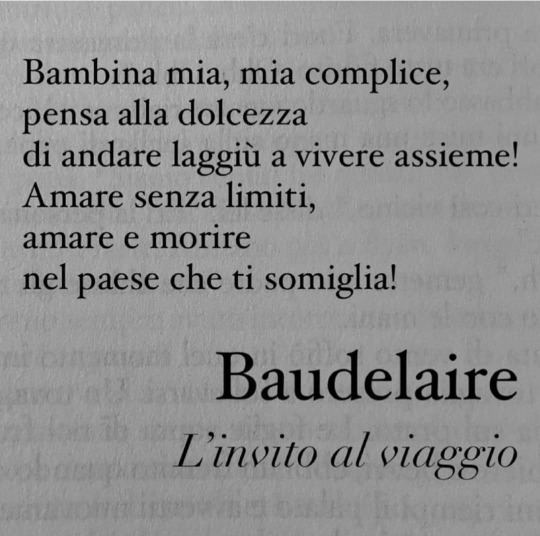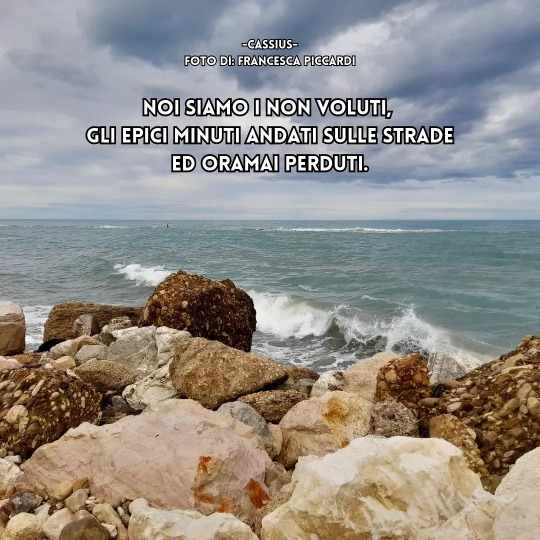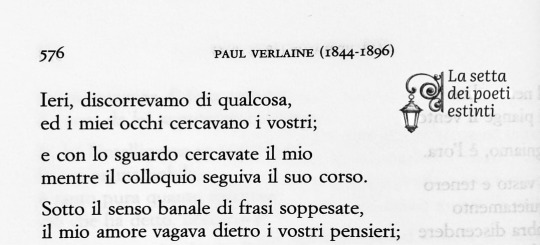#poeti
Text

#poesia#poesie#letteratura#poesia italiana#poeti#citazioni dei libri#frasi romantiche#italian poetry#poesie d’amore#poetry#citazioni#frasi#poesìa#ffferite
2K notes
·
View notes
Text

#pensieri#thinking#poetic#poesia#versi#pensieri sparsi#love#amore#citazioni#charles baudelaire#baudelaire#fiori del male#fiori#male#maledetti#poeti#poetry#poeti maledetti#viaggio
66 notes
·
View notes
Text
Foscolo, Alla Sera
Forse perché della fatal quïete
Tu sei l’immago a me sì cara, vieni,
O Sera! E quando ti corteggian liete
Le nubi estive e i zeffiri sereni,
E quando dal nevoso aere inquiete
Tenebre, e lunghe, all’universo meni,
Sempre scendi invocata, e le secrete
Vie del mio cor soavemente tieni.
Vagar mi fai co’ miei pensier su l’orme
Che vanno al nulla eterno; e intanto fugge
Questo reo tempo, e van con lui le torme
Delle cure, onde meco egli si strugge;
E mentre io guardo la tua pace, dorme
Quello spirto guerrier ch’entro mi rugge.
Poetic translation (pretty accurate):
Perhaps because of that fatal quiet
you are the image so dear to me, you come,
O Evening! And when happy summer clouds
and the gentle Zephyr are your escort,
and when from snowy restless air
you throw darkness, and long, into the universe,
you descend summoned always, and the secret
roads of my heart gently hold.
You make me wander with my thoughts on tracks
that vanish into eternal nothing; meanwhile flees
this cursed time, and with it, the throng
of worries with which it destroys with me itself;
and while I gaze on your peace, sleeps
that warlike spirit that within me roars.
✦
Foscolo, my dear love - in poetry only. My guy is wonderful when thoroughly confined to his standard eleven sillables, and starts to become obnoxiously verbose in anything longer than that.
Hope you'll forgive me for messing up the methrics in traslation; there's not much i can do about language, and i felt like the meaning was better to carry across than the rhythm. It is to be said that his adherence to the standard forms down to the rhyme - precise ABAB ABAB CDC DCD as it's usual for sonnets - really does add something to the poems. The mix of influences coming from both different art currents (neo classicism and romanticism, mainly) and direct cultures (italian, english, greek) comes in through the content as well as the form.
As his poems often do, this one talks of death, and contemplation of nature. A man pained with sorrows - it's Foscolo, so we're mostly looking at political turmoil, but classic romantic anguish and generic nostalgia are not excluded - takes peace in a quiet evening, taking in his own mortality (as it is death, in the end, that takes away everything). Even then, the poet isn't just sad, isn't abandoned to his own feelings: as every Just Soul would, a quiet anger simmers in his veins, waiting for the right moment.
There's something to be said, as always, on the mechanism phylosphy as a whole - even if it doesn't shine in this poem as well as others (go read De Sepolcri right now actually). Nature can be hard and cruel like it can be soft and summery, but it offers to all the peaceful rest of death, returning in Her. Many call it pessimism, but i personally can't see how being a smell little cog in the big machine of nature would be a bad thing - is it so cruel to be a being who's purpose in life is just to live, and be granted peace to any sorrows?
#poem#poetry#poems#poets#poetry on tumblr#poesia#poesie#poeti#poesia italiana#italian poetry#italian#italiano#foscolo#ugo foscolo
24 notes
·
View notes
Text

❤️🩹...
#amore#amore a distanza#frasi e citazioni#frasi belle#citazioni#parole#frasi#frasi d'amore#frasi tumblr#pensieri tumblr#citazione libro#leggere libri#frasi libri#citas de libros#citazione poesia#poeti#non ci sei#amore tossico
26 notes
·
View notes
Text
Gruppo telegram:)
Sto creando un nuovo gruppo telegram, quindi se ne volete far parte scrivetemi. Vi aspetto:)
#Telegram#gruppo#gruppo telegram#amicizie#nuove amicizie#scrivetemi#frasi belle#frasi bellissime#poesia#poeti
21 notes
·
View notes
Text
“ Non sono nata per essere ragionevole. Sono nata per amare, per essere felice, per odiare, per immaginare, per inventare, per capire e anche, di tanto in tanto, per essere ragionevole, ma non devo essere ragionevole. Essere ragionevole vuol dire adattare i propri pensieri a quel che gli è contrario; modificare e distorcere la propria intelligenza per assecondare i desideri altrui. La mia ragionevolezza è diversa da quella di un altro. La ragione pretende la felicità. La ragionevolezza tende al possibile. La felicità non può essere catturata dal possibile. La felicità è l’avvento del miracolo. Il miracolo produce la virtú e la grazia, non viceversa. “
Patrizia Cavalli, Con passi giapponesi, Einaudi, 2019¹; p. 132.
#Patrizia Cavalli#letture#leggere#poeti#ragione#inventare#Con passi giapponesi#felicità#meditazione#immaginazione#poesia contemporanea#ragionevolezza#pensieri#intelligenza#intellettuali italiani contemporanei#desideri#miracolo#libri#raccolta di racconti#poeti italiani#poetesse#poesia#vita#poesia italiana contemporanea#intellettuali#pensiero critico#personalità#individualità#singolarità#cultura
41 notes
·
View notes
Text
Dicono che nella vita
bisognerebbe provare
almeno una volta
l'amore di un poeta
uno scrittore
un musicista
Ti chiedo quindi se ti andrebbe
(solo se vuoi)
di diventare la mia ispirazione,
come Beatrice fu per Dante
Frida fu per Diego
Jeanne fu per Modigliani
- Sonia Petruzzelli, Non c’è Rosa senza Spine
#citazioni#letteratura#libridaleggere#poetry#poesia#quotes#edgar allan poe#frasi di libri#poesie#books#amore#amicizia#poeti#poeta
18 notes
·
View notes
Text
Il Piacere- Gabriele D'Annunzio
Ci sono certi sguardi di donna che l’uomo amante non iscambierebbe con l’intero possesso del corpo di lei. Chi non ha veduto accendersi in un occhio limpido il fulgore della prima tenerezza non sa la più alta delle felicità umane. Dopo, nessun altro attimo di gioia eguaglierà quell’attimo.
7 notes
·
View notes
Text
"C'é la libertá che ti sta aspettando,
sulla brezza del cielo,
e tu mi chiedi "e se cado?"
oh ma mia cara,
e se voli?"
~ Erin Hanson
#poeti#poesia#poets on tumblr#citazioni#frasi e citazioni#cit#citazione#nuovi blog#frasi#vita#ambizione#obiettivo#obiettivi#cielo#sky#volare#flying#fly#love#amore#dark#libertá#freedom#free
8 notes
·
View notes
Text
Amanti e matti hanno cervelli così in ebollizione, e così fervide fantasie, che scoprono più cose di quante non riesca a coglierne il freddo ragionamento. Il lunatico, l'innamorato e il pota sono tutti infarciti di immaginazione: l'uno vede più diavoli che non ne contenga l'inferno: e quello è il lunatico; l'altro, del pari frenetico, vede nel volto d'una egiziana la chiara bellezza di Elena: e quello è l'innamorato. Poi c'è il poeta: l'occhio suo, nello squisito delirio, può contemplare il cielo dalla terra e la terra dal cielo. E mentre la fantasia gli va suggerendo forme di cose sconosciute, la sua penna le ferma; e a quei nulli d'aria dà nome, e sito e dimora.
#1596#sogno di una notte di mezza estate#atto quinto#shakespeare#citazioni#citazione#citazioni libri#citazione libro#amore#william shakespeare#letteratura#letteratura inglese#Il Sogno di una notte d'estate#il sogno di una notte d'estate#William Shakespeare#William Shakespeare citazioni#William Shakespeare citazione#Sogno di una notte di mezza estate#poeti#anime#anima
5 notes
·
View notes
Text

Noi siamo i non voluti,
gli epici minuti andati sulle strade
ed oramai perduti.
Cassius (Daniele Scopigno)
Foto di: Francesca Piccardi
Se volete sostenere le mie creazioni potete farlo con una libera donazione al seguente link: paypal.me/DanieleScopigno
#scrittori#poetiitaliani#leggere#scrittoriitaliani#poeti#viaggiare#mare#panorama#letteratura#frasi belle#frasi tumblr#frasi italiane#frasi e citazioni#frasi#frasi libri#libri#scrittore#poetizando#poesie
2 notes
·
View notes
Text

#pensieri#thinking#poetic#poesia#versi#pensieri sparsi#love#amore#citazioni#paul verlaine#poeti#poetas#poeti maledetti#maledetto#poetry
20 notes
·
View notes
Text
Sappho, Fragment 34 Voigt
ἄστερες μὲν ἀμφὶ κάλαν σελάνναν
ἂψ ἀπυκρύπτοισι φάεννον εἶδος
ὄπποτα πλήθοισα μάλιστα λάμπη
γᾶν <ἐπὶ παῖσαν>
****
ἀργυρία
Poetic translation:
The gleaming stars all about the shining moon
Hide their bright faces, when full-orbed and splendid
In the sky she floats, flooding the shadowed earth
with clear silver light.
Literal translation:
The stars about the fair moon lose their bright beauty when she, almost full, shines [on all] earth with silver.
Free of any human interaction, somehow still full of Sappho's typical melanchony, it offers a personified view of the cosmos like embarassed little girls watching in awe as a woung woman shines bright with silver.
Because the stars are clearly the focus, the first word we can see and what I think the reader should relate to; we all pale in comparison to bright, shiny full moon, so gracious to bathe of all us in her light - and the stars are, here, no less human.
For italian speakers, I higly recommend this analysis by the University of Bologna, that goes into finer detail than I ever could.
Certainly my very favorite of all of Sappho's work. I'm already a sucker for nocturnals - Sappho and Leopardi, long loves of mine, feed me well in that regard - and this one takes the cake.
Also one of the firsts of hers I've ever had to translare, which doesn't helo lessen my enjoyment for sure. The beauty in her fragments is also in the unsaid, unseen; was the silver surely the light, or is there in the line we're missing, some other feminine noun to complete it?
It also makes me kind of mad, solely because a lot of poetry sites out there dealing with ancient greek poetry conviniently forget to inform that we don't actually have the whole poem, a lot of it are just guesses (even if based on studies and evidences) and meaning isn't as clear as they make it seem. For example, almost none of the sites i've searched through for a translation mentioned that "on all" the earth isn't in the text, but was assumed through studies and is often marked as such in greek. Or that there's a whole missing line between that and "silver".
Regardless, I hope that this translitteration and translation can be of satisfaction, especially to those much more expert in this subject than little ol me.
↑ the analysis link again, for easier clicking.
#poetry#poem#poems#poets#poetry on tumblr#poesia#poesie#poeti#ancient poetry#sappho#ancient greek poetry#poetry analysis#greek poetry#sappho poetry#this one is super early bc i couln't wait to start lmao#next ones are each going to be on a monday i prommy
17 notes
·
View notes
Text
Stamattina mi imbatto in una pubblicità (piuttosto bruttina, in verità, e poco curata dal punto di vista grafico) che promuove un concorso di poesia che i poeti li immagina in un’isola – un po’ come dire: au-dessus de la mêlée, fuori dalla mischia, lontano dalla pazza folla, non invischiati in lotte e competizioni – e, per diffondere il suo bando (competitivo), codesta inserzione poetico-pubblicitaria sceglie un fotogramma di un film, l’ultimo di Massimo Troisi, dedicato a don Pablo Neruda.

Ne parlo più diffusamente nel mio blog...
aitanblog.wordpress.com/2024/04/07/lisola-dei-peti/
#poesia#poeti#peti#versi#perversi#gare#festival#concorsi#concorsi letterari#concorsi di poesia#poesie#aletti
2 notes
·
View notes
Text

Main masterlist🕊️
Random🖋️
Foscolo is just delulu
Silly red hat man🖋️
Genshin impact danteification @moonschocolate
#masterlist#italian literature#Italian tag#roba italiana#italians on tumblr#italian stuff#italian tumblr#letteratura italiana#letteratura#poesia#meme#funny joke#poeti#poetry#poets#dante alighieri#Niccolò Machiavelli#francesco petrarca#torquato tasso#Gaspara stampa#giovanni boccaccio#giacomo leopardi#italian poetry#alessandro manzoni#ludovico ariosto#divina commedia#divine comedy#petrarch
4 notes
·
View notes
Text
“ La ragazzina con i capelli chiari sale sulla collina quasi tutti i giorni e il bisnonno racconta fiero che la figlia maggiore gioca con gli elfi. Dio aiuti quella povera bambina, dicono alcuni, allora lui si arrabbia oppure scoppia a ridere. Una volta la ragazzina torna a casa con un sasso dalla forma strana, sembra proprio un esserino, tutti intorno al tavolo lo studiano, se lo rigirano tra le dita, lei regala il sasso alla sorella più piccola, arriva la primavera e il cielo dissemina uccelli acquatici sulla penisola di Snæfellsnes.
Vanno ad Arnarstapi, il bisnonno lo definisce «un giro di compere in città» anche se città è un termine esagerato per questo gruppetto di case sparse. Eppure qualche volta il significato delle parole può cambiare a seconda di come le guardi, il che è un bene, vuol dire che esiste ancora qualche differenza tra le persone, tra i luoghi, vuol dire che c’è ancora un po’ di vita e di movimento nel linguaggio.
Per mio nonno e per la sua sorellina Arnarstapi è una città, una quantità impressionante di edifici. Lui ha quasi sette anni, lei quasi cinque e quell’anno trascorso sulla Snæfellsnes ha avvolto Reykjavík nella nebbia dell’oblio. Quando sei così piccolo i ricordi dell’anno precedente possono confondersi con i sogni. La figlia più grande fa una smorfia quando vede le sparute case di Arnarstapi. Il bisnonno parla con la gente, si informa, si presenta, la bisnonna fa compere poi va a passeggio con i bambini. C’è una casa un po’ distante dalle altre, come se cercasse di sottrarsi da qualcosa; una piccola casa di legno dove abita il capitano dai capelli rossi. Volevo dirti che non c’è bisogno che veniate da noi nelle prossime sei settimane, ci siamo riforniti di tutto il necessario con questo giro. Il capitano dice: ah sì, siete venuti a fare acquisti. È piccola e carina la tua casa, dice la bisnonna, è un po’ in disparte dalle altre. Mi piace stare al margine. Ah, ecco, bene, dice lei; in effetti non c’è altro da aggiungere, e lo saluta. Ma lui guarda i bambini e dice: in casa da me c’è un uccello con un’ala rotta, voglio farlo andare un po’ fuori, dopo.
Rimangono da lui per un’ora. A un certo punto la bisnonna e il capitano si ritrovano l’uno accanto all’altra, tanto vicini che le leggi perdono valore, tanto vicini che lei sente l’odore del pesce e del suo corpo caldo. “
Jón Kalman Stefánsson, Crepitio di stelle, traduzione dall'islandese di Silvia Cosimini, Iperborea (collana Gli Iperborei n° 330), Milano, 2021³, pp. 190-191.
[1ª Edizione originale: Snarkið í stjörnunum, Bjartur, Reykjavík, 2003]
#Crepitio di stelle#letture#leggere#libri#citazioni letterarie#Jón Kalman Stefánsson#romanzi#romanzo#Paesi nordici#letteratura contemporanea#nostalgia#passato#casa#ricordi#letteratura islandese#Reykjavík#Islanda#Iperborea#scrittori#letteratura scandinava#Jón Kalman#scrittori islandesi#luoghi#Snarkið í stjörnunum#poeti#narrativa#Silvia Cosimini#vita#ricordi di famiglia#antenati
5 notes
·
View notes